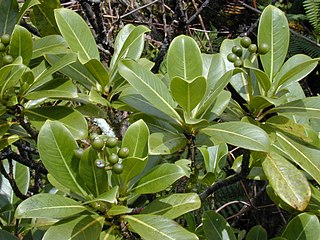
The Rubiaceae are a family of flowering plants, commonly known as the coffee, madder, or bedstraw family. It consists of terrestrial trees, shrubs, lianas, or herbs that are recognizable by simple, opposite leaves with interpetiolar stipules and sympetalous actinomorphic flowers. The family contains about 13,500 species in about 620 genera, which makes it the fourth-largest angiosperm family. Rubiaceae has a cosmopolitan distribution; however, the largest species diversity is concentrated in the tropics and subtropics. Economically important species include Coffea, the source of coffee, Cinchona, the source of the antimalarial alkaloid quinine, some dye plants, and ornamental cultivars.

Psychotria carthagenensis, also known as amyruca, is a South American rainforest understory shrub from the coffee family, Rubiaceae. It grows from the tropics of South America to Mexico.

Psychotria is a genus of flowering plants in the family Rubiaceae. It contains 1,582 species and is therefore one of the largest genera of flowering plants. The genus has a pantropical distribution and members of the genus are small understorey trees in tropical forests. Some species are endangered or facing extinction due to deforestation, especially species of central Africa and the Pacific.

Palicourea is a plant genus in the family Rubiaceae. It contains about 200 species, which range from shrubs to small trees, and is distributed throughout the New World tropics.
Psychotria dura is a species of flowering plant in the family Rubiaceae. It is endemic to Jamaica.
Psychotria gardneri is a species of plant in the family Rubiaceae. It is endemic to Sri Lanka.
Psychotria greenwelliae, the Kauai wild coffee, is a species of plant in the family Rubiaceae. It is endemic to the islands of Kauai and Oahu in Hawaii. It is threatened by habitat loss.
Psychotria marchionica is a species of flowering plant in the family Rubiaceae. It is endemic to the Marquesas Islands.
Psychotria cernua is a species of flowering plant in the family Rubiaceae. It is endemic to Tahiti.
Psychotria insularum is a rainforest understory shrub from the coffee family, Rubiaceae. Its native range is the South Pacific.
Psychotria rufipilis is an African rainforest understory shrub from the coffee family, Rubiaceae.

Psychotria mariniana, the forest wild coffee or kōpiko, is a tree endemic to Hawaiʻi. The plant belongs to the Rubiaceae (coffee) family, subfamily Rubioidae. It is a tree of varying size with a dark bark, shiny leaves, and orange oval fruit.

Psychotridine is an alkaloid found in some species of the genus Psychotria, namely Psychotria colorata, but also Psychotria forsteriana, Psychotria lyciiflora, Psychotria oleoides, and Psychotria beccarioides. Psychotridine has analgesic effects and dose-dependently inhibits dizocilpine binding to cortical membranes in vitro, suggesting that it acts as a non-competitive NMDA receptor antagonist.

Xylophanes porcus, the porcus sphinx, is a moth of the family Sphingidae. The family was first described by Jacob Hübner in 1823. It is found from Florida south to Bolivia.
Candidatus Caballeronia kirkii is a Gram-negative, non-fermenting bacterium from the genus Caballeronia and the family Burkholderiaceae. Ca. C. kirkii is an endosymbiont of the plant Psychotria kirkii, also known as Rubiaceae, and exists inside leaf and stem nodules.

Psychotria punctata, the dotted wild coffee, is a species of plants in the family Rubiaceae.

Psychotrieae is a tribe of flowering plants in the family Rubiaceae and contains about 2114 species in 17 genera. Its representatives are found in the tropics and subtropics.

Dr.Charlotte M. Taylor is a botanist and professor specialising in taxonomy and conservation. She works with the large plant family Rubiaceae, particularly found in the American tropics and in the tribes Palicoureeae and Psychotrieae. This plant family is an economically important group, as it includes plant species used to make coffee and quinine. Taylor also conducts work related to the floristics of Rubiaceae and morphological radiations of the group. Taylor has collected plant samples from many countries across the globe, including Chile, Colombia, Costa Rica, Panama, and the United States of America, and has named many new species known to science from these regions. As of 2015, Taylor has authored 278 land plant species' names, the seventh-highest number of such names authored by any female scientist.
Psychotria aborensis is a plant species in the family Rubiaceae. It is endemic to Bhutan.

Psychotria tenuifolia, commonly known as velvet-leaved wild coffee, is a species of plant in the family Rubiaceae. It is endemic to southern Florida, South America and the Caribbean.. The description of velvet is based on the silky appearance that the leaves display in relation to other species of the same plant family.










